Dick Clark
Dick Clark | |
|---|---|
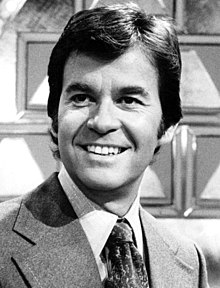 Clark in 1974 | |
| Born | Richard Wagstaff Clark November 30, 1929 Bronxville, New York,U.S. |
| Died | April 18, 2012(aged 82) |
| Alma mater | Syracuse University |
| Occupations |
|
| Years active | 1945–2012 |
| Organization | Dick Clark Productions |
| Known for | American Bandstand Pyramid Dick Clark's New Year's Rockin' Eve |
| Spouses | Barbara Mallery
(m.1952;div.1961)Loretta Martin
(m.1962;div.1971)Kari Wigton (m.1977) |
| Children | 3, includingDuane |
| Awards | Full list |
Richard "Dick" Wagstaff Clark[1][2](November 30, 1929 – April 18, 2012) was an American television and radio personality and television producer who hostedAmerican Bandstandfrom 1956 to 1989. He also hosted five incarnations of thePyramidgame showfrom 1973 to 1988 andDick Clark's New Year's Rockin' Eve,which broadcast New Year's Eve celebrations in New York City'sTimes Square.
As host ofAmerican Bandstand,Clark introducedrock and rollto many Americans. The show gave many new music artists their first exposure to national audiences, includingIke & Tina Turner,Smokey Robinson and the Miracles,Stevie Wonder,Simon & Garfunkel,Iggy Pop,Prince,Talking Heads,andMadonna.Episodes he hosted were among the first in which black people and white people performed on the same stage, and they were among the first in which the live studio audience sat down together withoutracial segregation.SingerPaul Ankaclaimed thatBandstandwas responsible for creating a "youth culture".Due to his perennially youthful appearance and his largely teenaged audience ofAmerican Bandstand,Clark was often referred to as "America's oldest teenager" or "the world's oldest teenager".[3][4]
In his off-stage roles, Clark served as chief executive officer ofDick Clark Productions(though he sold his financial interest in the company during his later years). He also founded theAmerican Bandstand Diner,a restaurant chain themed after the television program of the same name. In 1973, he created and produced the annualAmerican Music Awardsshow, similar to theGrammy Awards.[3]
Early life
[edit]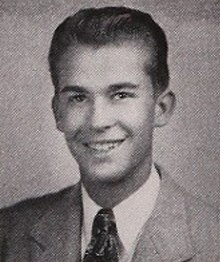
Clark was born inBronxville, New York,and raised in neighboringMount Vernon,[5]the second child of Richard Augustus Clark and Julia Fuller Clark, née Barnard. His only sibling, elder brother Bradley, aWorld War IIP-47 Thunderboltpilot, was killed in theBattle of the Bulge.[6]
Clark attended Mount Vernon's A.B. Davis High School (later renamed A.B. Davis Middle School), where he was an average student.[7]At the age of 10, Clark decided to pursue a career in radio.[7]In pursuit of that goal, he attendedSyracuse University,graduating in 1951 with a degree in advertising and a minor in radio.[7]While at Syracuse, he was a member ofDelta Kappa Epsilonfraternity (Phi Gamma).[8]
Radio and television career
[edit]In 1945, Clark began his career working in the mailroom atWRUN,anAMradio station inUtica, New York,that was owned by his uncle and managed by his father. Almost immediately, he was asked to fill in for the vacationing weatherman and, within a few months, he was announcing station breaks.[7]
While attending Syracuse, Clark worked atWOLF-AM,then a country music station. After graduation, he returned to WRUN for a short time where he went by the name Dick Clay.[7]After that, Clark got a job at the television stationWKTVinUtica, New York.[7]His first television-hosting job was onCactus Dick and the Santa Fe Riders,acountry-musicprogram. He later replacedRobert Earle(who later hosted theGE College Bowl) as a newscaster.[9]
In addition to his announcing duties on radio and television, Clark owned several radio stations. From 1964 to 1978, he owned KPRO (nowKFOO) inRiverside, Californiaunder the name Progress Broadcasting.[10][11]In 1967, he purchased KGUD-AM-FM (nowKTMSandKTYDrespectively) inSanta Barbara, California.[12][13]
American Bandstand
[edit]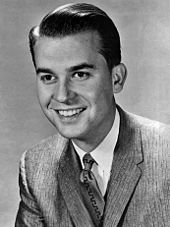
In 1952, Clark moved toDrexel Hill, Pennsylvania,a suburb ofPhiladelphia,where he took a job as a disc jockey at radio stationWFIL,adopting the Dick Clark handle.[14]WFIL had an affiliated television station (nowWPVI) with the samecall sign,which began broadcasting a show calledBob Horn's Bandstandin 1952. Clark was responsible for a similar program on the company's radio station and served as a regular substitute host when Horn went on vacation.[7]In 1956, Horn was arrested for drunk driving and was subsequently dismissed.[7]On July 9, 1956, Clark became the show's permanent host.[7]
Bandstandwas picked up by theABCtelevision network, renamedAmerican Bandstand,and debuted nationally on August 5, 1957.[15]The show took off, due to Clark's natural rapport with the live teenage audience and dancing participants as well as the "clean-cut, non-threatening image" he projected to television audiences.[16]As a result, many parents were introduced to rock and roll music. According to Hollywood producerMichael Uslan,"he was able to use his unparalleled communication skills to presentrock 'n rollin a way that was palatable to parents. "[17]James Sullivan ofRolling Stonestated that "Without Clark, rock & roll in its infancy would have struggled mightily to escape the common perception that it was just a passing fancy."[18]
In 1958,The Dick Clark Showwas added to ABC's Saturday night lineup.[7]By the end of year, viewership exceeded 20 million, and featured artists were "virtually guaranteed" large sales boosts after appearing.[7]In a surprise television tribute to Clark in 1959 onThis Is Your Life,hostRalph Edwardscalled him "America's youngest starmaker", and estimated the show had an audience of 50 million.
Clark moved the show from Philadelphia to Los Angeles in 1964.[7]The move was related to the popularity of new "surf" groups based in southern California, includingThe Beach BoysandJan and Dean.After moving to Los Angeles, the show became more diverse and featured more minorities.[19]The show was notable for promotingdesegregationin popular music and entertainment by prominently featuring black musicians and dancers.[20][18]Prior to this point, the show had largely excluded black teenagers.[21][22]
The show ran daily Monday through Friday until 1963, then weekly on Saturdays until 1988.Bandstandwas briefly revived in 1989, withDavid Hirschtaking over hosting duties. By the time of its cancellation, the show had become the longest-running variety show in TV history.[7]
In the 1960s, the show's emphasis changed from merely playing records to including live performers. During this period, many of the leading rock bands and artists of the 1960s had their first exposure to nationwide audiences. A few of the many artists introduced wereIke and Tina Turner,Smokey Robinson and the Miracles,The Beach Boys,Stevie Wonder,Prince,Simon and Garfunkel,Jerry Lee Lewis,Buddy Holly,Bobby Fuller,Johnny Cash,Sam Cooke,Fats DominoandChubby Checker.[23][24]
During an interview with Clark by Henry Schipper ofRolling Stonemagazine in 1990, it was noted that "over two-thirds of the people who've been initiated into theRock and Roll Hall of Famehad their television debuts onAmerican Bandstand,and the rest of them probably debuted on other shows [they] produced. "[25]During the show's lifetime, it featured over 10,000 live performances, many by artists who were unable to appear anywhere else on TV, as the variety shows during much of this period were "antirock".[25]Schipper points out that Clark's performers were shocking to general audiences:
The music establishment, and the adults in general, really hatedrock and roll.Politicians, ministers, older songwriters and musicians foamed at the mouth.Frank Sinatrareportedly called Elvis Presley a "rancid-smelling aphrodisiac".[25]
Clark was therefore considered to have a negative influence on youth and was well aware of that impression held by most adults:
I was roundly criticized for being in and around rock and roll music at its inception. It was the devil's music, it would make your teeth fall out and your hair turn blue, whatever the hell. You get through that.[26]
In 2002, many of the bands he introduced appeared at the 50th anniversary special to celebrateAmerican Bandstand.[27]Clark noted during the special thatAmerican Bandstandwas listed in theGuinness Book of Recordsas "the longest-running variety show in TV history." In 2010,American Bandstandand Clark himself were honored at the Daytime Emmy Awards.[28]Hank Ballard,who wrote "The Twist", described Clark's popularity during the early years ofAmerican Bandstand:
The man was big. He was the biggest thing in America at that time. He was bigger than the president![29]
As a result of Clark's work onBandstand,journalist Ann Oldenburg states "he deserves credit for doing something bigger than just putting on a show."[29]Los Angeles Timeswriter Geoff Boucher goes further, stating that "with the exception of Elvis Presley, Clark was considered by many to be the person most responsible for the bonfire spread ofrock 'n rollacross the country in the late 1950s ", making Clark a" household name ".[17]He became a "primary force in legitimizing rock 'n' roll", adds Uslan. Clark, however, simplified his contribution:
I played records, the kids danced, and America watched.[30]
Shortly after becoming its host, Clark also ended the show's all-white policy by featuring black artists such asChuck Berry.In time, blacks and whites performed on the same stage, and studio seating was desegregated.[23]Beginning in 1959 and continuing into the mid-1960s, Clark produced and hosted theCaravan of Stars,a series of concert tours built upon the success ofAmerican Bandstand,which by 1959 had a national audience of 20 million.[29]However, Clark was unable to hostElvis Presley,theBeatlesor theRolling Stoneson either of his programs.[17]
The reason for Clark's impact on popular culture has been partially explained byPaul Anka,a singer who appeared on the show early in his career: "This was a time when there was no youth culture — he created it. And the impact of the show on people was enormous."[31]In 1990, a couple of years after the show had been off the air, Clark considered his personal contribution to the music he helped introduce:
My talent is bringing out the best in other talent, organizing people to showcase them and being able to survive the ordeal. I hope someday that somebody will say that in the beginning stages of the birth of the music of the fifties, though I didn't contribute in terms of creativity, I helped keep it alive.[25]
Payola hearings
[edit]In 1960, theUnited States Senateinvestigatedpayola,the practice of music-producing companies paying broadcasting companies to favor their product. As a result, Clark's personal investments in music publishing and recording companies were considered a conflict of interest, and he sold his shares in those companies.[32]
When asked about some of the causes for the hearings, Clark speculated about some of the contributing factors not mentioned by the press:
Politicians... did their damnedest to respond to the pressures they were getting from parents and publishing companies and people who were being driven out of business [by rock].... It hit a responsive chord with the electorate, the older people.... they full-outhatedthe music. [But] it stayed alive. It could've been nipped in the bud, because they could've stopped it from being on television and radio.[25]
As reported by aNew York Times Magazineinterview with Dick Clark,Gene Shalitwas Clark's press agent in the early 1960s. Shalit reportedly "stopped representing" Clark during the Congressional investigation ofpayola.Clark never spoke to Shalit again, and referred to him as a "jellyfish".[33]
Game show host
[edit]Beginning in late 1963, Clark branched out into hosting game shows, presiding overThe Object Is.[34]The show was canceled in 1964 and replaced byMissing Links,which had moved fromNBC.Clark took over as host, replacingEd McMahon.[34]
Clark became the first host ofThe $10,000 Pyramid,which premiered on CBS March 26, 1973.[35]The show — a word-association game created and produced by daytime television producerBob Stewart— moved to ABC in 1974. Over the coming years, the top prize changed several times (and with it the name of the show), and several primetime spinoffs were created.[35]
As the program moved back to CBS in September 1982, Clark continued to host the daytime version through most of its history, winning threeEmmy Awardsfor best game show host.[36]In total,Pyramidwon nine Emmy Awards for best game show during his run, a mark that is eclipsed only by the twelve won by thesyndicatedversion ofJeopardy!.[37]Clark's finalPyramidhosting gig,The $100,000 Pyramid,ended in 1988.[38]
Clark subsequently returned toPyramidas a guest in later incarnations. During the premiere of theJohn Davidsonversion in 1991, Clark sent a pre-recorded message wishing Davidson well in hosting the show. In 2002, Clark played as a celebrity guest for three days on theDonny Osmondversion. Earlier, he was also a guest during theBill Cullenversion ofThe $25,000 Pyramid,which aired simultaneously with Clark's daytime version of the show.[39]
Entertainment Weeklycredited Clark's "quietly commanding presence" as a major factor in the game show's success.[35]
Clark hosted the syndicated television game showThe Challengers,during its only season (1990–91).The Challengerswas a co-production between the production companies of Dick Clark andRon Greenberg.During the 1990–91 season, Clark and Greenberg also co-produced a revival ofLet's Make a Dealfor NBC withBob Hiltonas the host. Hilton was later replaced by original hostMonty Hall.Clark later hostedScattergorieson NBC in 1993; andThe Family Channel's version ofIt Takes Twoin 1997. In 1999, along with Bob Boden, he was one of the executive producers ofFox's TV game showGreed,which ran from 5 November 1999, to 14 July 2000, and was hosted byChuck Woolery.At the same time, Clark also hosted the Stone-Stanley-createdWinning Lines,which ran for six weeks on CBS from 8 January through 12 February 2000,Geraldo Riverawas actually supposed to hostWinning Linesbut couldn't agree on the contract, so CBS selected Clark to host.[40]
He concluded his game show hosting career with another of his productions,Challenge of the Child Geniuses,a series of two two-hour specials broadcast on Fox in May and November 2000.
Dick Clark's New Year's Rockin' Eve
[edit]In 1972, Dick Clark first producedNew Year's Rockin' Eve,a New Year's Eve music special forNBCwhich included coverage of theball drop festivitiesin New York City. Clark aimed to challenge the dominance ofGuy Lombardo's New Year's specials onCBS,as he believed itsbig bandmusic was too dated. After two years on NBC—during which the show was hosted byThree Dog NightandGeorge Carlin,respectively—the program moved to ABC, and Clark assumed hosting duties. Following Lombardo's death in 1977,Rockin' Eveexperienced a surge in popularity and later became the most-watched annual New Year's Eve broadcast. Clark also served as a special correspondent forABC News'sABC 2000 Todaybroadcast, covering the arrival of 2000.[41][42][43]
Following his stroke (which prevented him from appearing at all on the 2004–05 edition),[44]Clark returned to make brief appearances on the 2005–06 edition while ceding the majority of hosting duties toRyan Seacrest.Reaction to Clark's appearance was mixed. While some TV critics (including Tom Shales ofThe Washington Post,in an interview with theCBS Radio Network) felt that he was not in good enough shape to do the broadcast, stroke survivors and many of Clark's fans praised him for being a role model for people dealing with post-stroke recovery.[42][45]Seacrest remained host and an executive producer of the special, assuming full duties after Clark's death.[46]
Radio programs
[edit]Clark's first love was radio and, in 1963, he began hosting a radio program calledThe Dick Clark Radio Show.It was produced by Mars Broadcasting ofStamford.Despite Clark's enormous popularity onAmerican Bandstand,the show was only picked up by a few dozen stations and lasted less than a year.[47]
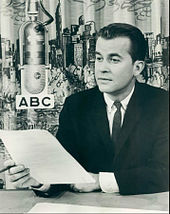
On March 25, 1972, Clark hostedAmerican Top 40,filling in forCasey Kasem.[48]In 1981, he createdThe Dick Clark National Music Surveyfor theMutual Broadcasting System.[36]The program counted down the top 30 contemporary hits of the week in direct competition withAmerican Top 40.Clark left Mutual in October 1985, and Bill St. James (and later Charlie Tuna) took over the National Music Survey.[36]Clark's United Stations purchased RKO Radio Network in 1985 and, when Clark left Mutual, he began hosting USRN's "Countdown America" which continued until 1995.
In 1982, Clark launched his own radio syndication group with partners Nick Verbitsky andEd Salamoncalled the United Stations Radio Network. That company later merged with the Transtar Network to become Unistar. In 1994, Unistar was sold to Westwood One Radio. The following year, Clark and Verbitsky started over with a new version of the USRN, bringing into the foldDick Clark's Rock, Roll & Remember,written and produced by Pam Miller (who also came up with the line used in the show and later around the world: "the soundtrack of our lives" ), and a new countdown show:The U.S. Music Survey,produced by Jim Zoller. Clark served as its host until his December 2004 stroke.[36]United Stations Radio Networkscontinues in operation as of 2020.
Dick Clark's longest-running radio show began on 14 February 1982.Dick Clark's Rock, Roll & Rememberwas a four-hour oldies show named after Clark's 1976 autobiography. The first year, it was hosted by veteran Los Angeles disc jockey Gene Weed. Then in 1983, voiceover talentMark Elliotco-hosted with Clark. By 1985, Clark hosted the entire show.Pam Millerwrote the program and Frank Furino served as producer. Each week, Clark profiled a different artist from the rock and roll era and counted down the top four songs that week from a certain year in the 1950s, 1960s or early 1970s. The show ended production when Clark suffered his December 2004 stroke. Reruns from the 1995–2004 era continued to air in syndication until USRN withdrew the show in 2020.
Other television programs
[edit]
At the peak of hisAmerican Bandstandfame, Clark also hosted a 30-minute Saturday night program calledThe Dick Clark Show(akaThe Dick Clark Saturday Night Beech-Nut Show). It aired from 15 February 1958, until 10 September 1960, on the ABC television network. It was broadcast live from the "Little Theater" in New York City and was sponsored by Beech-Nut gum. It featured the rock and roll stars of the day lip-synching their hits, just as onAmerican Bandstand.However, unlike the afternoonBandstandprogram, which focused on the dance floor with the teenage audience demonstrating the latest dance steps, the audience ofThe Dick Clark Showsat in a traditional theater setting. While some of the musical numbers were presented simply, others were major production numbers. The high point of the show was Clark's unveiling, with great fanfare at the end of each program, of the top ten records of the previous week.[49]This ritual became so embedded in American culture that it was imitated in many media and contexts, which in turn were satirized nightly byDavid Lettermanon his ownTop Ten lists.
From 27 September to December 20, 1959, Clark hosted a 30-minute weekly talent/variety series titledDick Clark's World of Talentat 10:30 p.m. Sundays on ABC. A variation of producer Irving Mansfield's earlierCBSseries,This Is Show Business(1949–1956), it featured three celebrity panelists, including comedianJack E. Leonard,judging and offering advice to amateur and semi-professional performers. While this show was not a success during its nearly three-month duration, Clark was one of the few personalities in television history on the air nationwide seven days a week.[49]
One of Clark's guest appearances was in the final episode ( "The Case of the Final Fade-Out" ) of the originalPerry MasonTV series, playing a character named "Leif Early" in a show that satirized the show business industry.[50]He appeared as a drag-racing-strip owner in a 1973 episode of theprocedural dramaseriesAdam-12.
Clark appeared in an episode ofPolice Squad!,in which he asks an underworld contact aboutskaand obtains skin cream to keep himself looking young.
Clark attempted to branch into the realm ofsoul musicwith the seriesSoul Unlimitedin 1973. The series, hosted byBuster Jones,was a more risqué and controversial imitator of the popular seriesSoul Trainand alternated in theBandstandtime slot. The series lasted for only a few episodes.[51]Despite a feud between Clark andSoul Traincreator and hostDon Cornelius,[52]the two men later collaborated on several specials featuring black artists.
Clark hosted the short-livedDick Clark's Live Wednesdayin 1978 for NBC.[53]In 1980, Clark served as host of the short-lived seriesThe Big Show,an unsuccessful attempt by NBC to revive the variety show format of the 1950s/60s. In 1984, Clark produced and hosted the NBC seriesTV's Bloopers & Practical Jokeswith co-hostEd McMahon.Clark and McMahon were longtime Philadelphia acquaintances, and McMahon praised Clark for first bringing him together with future TV partnerJohnny Carsonwhen all three worked at ABC in the late 1950s. TheBloopersfranchise stemmed from the Clark-hosted (and produced) NBCBloopersspecials of the early 1980s, inspired by the books, record albums and appearances ofKermit Schafer,a radio and TV producer who first popularized outtakes of broadcasts.[50]For a period of several years in the 1980s, Clark simultaneously hosted regular programs on all three major American television networks – ABC (Bandstand), CBS (Pyramid), and NBC (Bloopers).[54]
In July 1985, Clark hosted the ABC primetime portion of the historicLive Aidconcert, an all star concert designed byBob Geldofto end world hunger.[55]During the1988 Writers Guild of America strike,Clark (as host and producer) filled in a void on CBS' fall schedule withLive! Dick Clark Presents.[56]
Clark also hosted various pageants from 1988 to 1993 on CBS. He did a brief stint as announcer onThe Jon Stewart Showin 1995.[57]Two years later, he hosted thePennsylvania Lottery25th Anniversary Game Show special with then-Miss Pennsylvania Gigi Gordon forJonathan Goodson Productions.He also created and hosted two Fox television specials in 2000 calledChallenge of the Child Geniuses,[58]the last game show he hosted.[citation needed]
From 2001 to 2003, Clark was a co-host ofThe Other HalfwithMario Lopez,Danny BonaduceandDorian Gregory,a syndicated daytime talk show intended to be the male equivalent ofThe View.Clark also produced the television seriesAmerican Dreamsabout a Philadelphia family in the early 1960s whose daughter is a regular onAmerican Bandstand.The series ran from 2002 to 2005.[50]
Other media appearances
[edit]Clark wrote, produced and starred in the 1968 filmKillers Three,a Western drama that served as a promotional vehicle forBakersfield country musiciansMerle HaggardandBonnie Owens.
In 1967, Clark made an appearance in theBatmantelevision series.Clark also appears in interview segments of a 2002 film,Confessions of a Dangerous Mind,which was based on the "unauthorized autobiography" ofChuck Barris,who had worked at ABC as a standards-and-practices executive duringAmerican Bandstand'srun on that network.[59]
In the 2002Dharma & Gregepisode "Mission: Implausible", Greg is the victim of a college prank, and he devises an elaborate plan to retaliate, part of which involves his use of a disguise kit; the first disguise chosen is that of Dick Clark. During a fantasy sequence that portrays the unfolding of the plan, the real Clark plays Greg wearing his disguise.[60]
He also made brief cameos in two episodes ofThe Fresh Prince of Bel-Air.In one episode he plays himself at a Philadelphia diner, and in the other he helpsWill Smith's character hostbloopersfrom past episodes of that sitcom.[61]
With Ed McMahon, Clark was a spokesman forAmerican Family Sweepstakesuntil he quit over controversy from the company regarding their sales techniques.[62]Though McMahon continued until the company went out of business, Clark's previous involvement in the Payola scandal motivated him to be sensitive about his public image.
Business ventures
[edit]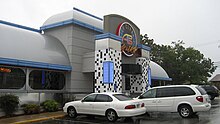
In 1965, Clark branched out from hosting, producingWhere the Action Is,an afternoon television program shot at different locations every week featuring house bandPaul Revere and the Raiders.[7]In 1973, Clark began producing the highly-successfulAmerican Music Awards.[7]In 1987, Dick Clark Productions went public.[7]Clark remained active in television and movie production into the 1990s.[7]
Clark had a stake in a chain of music-themedrestaurantslicensed under the names "Dick Clark's American Bandstand Grill",[63]"Dick Clark's AB Grill", "Dick Clark's Bandstand — Food, Spirits & Fun" and "Dick Clark's AB Diner".[64]There are currently two airport locations inNewark, New JerseyandPhoenix, Arizona;one location in theMolly Pitchertravel plaza on theNew Jersey TurnpikeinCranbury, New Jersey;and one location at "Dick Clark's American Bandstand Theater" inBranson, Missouri.Until recently,Salt Lake City,Utah had an airport location.[65]Other restaurants that have closed were located inKing Of Prussia(Pennsylvania); Miami;Columbus;Cincinnati;Indianapolis;andOverland Park(Kansas).
"Dick Clark's American Bandstand Theater" opened in Branson in April 2006,[66]and nine months later, a new theater and restaurant titled "Dick Clark's American Bandstand Music Complex" opened nearDolly Parton'sDollywoodtheme park inPigeon Forge, Tennessee.[67]
From 1979 to 1980, Clark reportedly owned the former Westchester Premier Theatre inGreenburgh, New York,renaming it the Dick Clark Westchester Theatre.[68]
Personal life
[edit]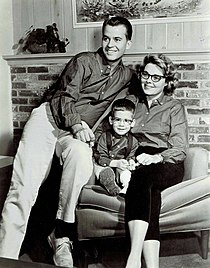
Clark was the son of Richard A. Clark, who managedWRUNradio inUtica, New York.[69]
He was married three times. His first marriage was to Barbara Mallery in 1952; the couple had one son, Richard A. Clark, and divorced in 1961. He married Loretta Martin in 1962; the couple had two children,Duaneand Cindy, and divorced in 1971. His third marriage, to Kari Wigton, whom he married in 1977, lasted until his death. He also had three grandchildren.[70]
Illness and death
[edit]During an interview onLarry King Livein April 2004, Clark revealed that he hadtype 2 diabetes.[71][72]His death certificate noted that Clark hadcoronary artery diseaseat the time of his death.[73]
On December 6, 2004, Clark was hospitalized in Los Angeles after suffering what was initially termed a minor stroke. Although he was expected to be treated without any serious complications, it was later announced that Clark would be unable to host his annualNew Year's Rockin' Evebroadcast, withRegis Philbinfilling in for him. Clark returned to the series the following year, but thedysarthriathat resulted from the stroke rendered him unable to speak clearly for the remainder of his life.
On April 18, 2012, Clark died from a heart attack at a hospital inSanta Monica, California,shortly after undergoing atransurethral resectionprocedure to treat anenlarged prostate.He was 82 years old.[73][48]After his estate obtained the necessary environmental permits, he was cremated on April 20 and his ashes were scattered over the Pacific Ocean.[74]
Legacy
[edit]Following Clark's death, longtime friend andHouse Rules CommitteeChairmanDavid Dreiereulogized Clark on the floor of theU.S. Congress.[75]PresidentBarack Obamapraised Clark's career: "WithAmerican Bandstand,he introduced decades' worth of viewers to the music of our times. He reshaped the television landscape forever as a creative and innovative producer. And, of course, for 40 years, we welcomed him into our homes to ring in the New Year. "[76]MotownfounderBerry Gordyand singerDiana Rossspoke of Clark's impact on the recording industry: "Dick was always there for me and Motown, even before there was a Motown. He was an entrepreneur, a visionary and a major force in changing pop culture and ultimately influencing integration," Gordy said. "He presented Motown andthe Supremeson tour with the "Caravan of Stars"and onAmerican Bandstand,where I got my start, "Ross said.[77]
Credits
[edit]Filmography
[edit]- Jamboree(1957) – Himself
- Because They're Young(1960) – Neil Hendry
- The Young Doctors(1961) – Dr. Alexander
- Killers Three(1968) – Roger
- The Phynx(1970) – Himself
- Spy Kids(2001) – Financier
- Bowling For Columbine(2002) – Himself (Documentary)
Television
[edit]- ABC 2000 Today– Times Square correspondent
- Adam-12(1972) – as drag strip owner Mr. J. Benson in the season 4 episode "Who Won?"
- American Bandstand– host
- Branded– guest-starred as J.A. Bailey in season 2 episode "The Greatest Coward on Earth"
- Burke's Law– as Peter Barrows, the son of a murdered financier in season 1 episode "Who Killed What His Name?"
- Coronet Blue– guest-starred as Victor Brunswick in the episode "The Flip Side of Timmy Devon"
- The Challengers– host
- The Chamber– producer
- Futurama– himself (as a head in a jar), season 1, episode 1, "Space Pilot 3000"
- Greed– producer
- Happening(1968–69) – producer
- It Takes Two(1997) – host
- The Krypton Factor(1981) – host
- Lassie(1966) – as J.H. Alpert in the episode "The Untamed Land"
- Missing Links(1964) – host
- Miss Teen USA(1988, 1991–1993) – host
- Miss Universe(1990–1993) – host
- Miss USA(1989–1993) – host
- Final Draw: 1994 FIFA World Cup(1993) – host
- New Year's Rockin' Eve(1972–2004) – host, (2006–2012) – co-host, producer
- Perry Mason,(1966) Season 9, episode 30, "The Case of the Final Fadeout"
- The Object Is(1963–1964) – host
- The Partridge Family,guest star, season 1, episode 13, Star Quality
- Pyramid– host (1973–1988), guest (The $25,000 Pyramid,1970s;Pyramid,2002)
- The Saturday Night Beech-Nut Show(1958–1960) – host
- Scattergories– host
- Stoney Burke(1963) – Sgt. Andy Kincaid in the episode "Kincaid"
- TV's Bloopers & Practical Jokes– co-host, producer
- Where the Action Is(1965–67) – host
- Police Squad!– himself, episode "Testimony of Evil (Dead Men Don't Laugh)"
- Wolf Rock TV– producer
- Winning Lines– host
- The Fresh Prince of Bel-Air– himself (two episodes)
Albums
[edit]- Dick Clark, 20 Years of Rock N' Roll(Buddah Records) (1973) (#9Canada[78])
- Rock, Roll & Remember, Vol. 1,2,3(CSP) (1983)
- Dick Clark Presents Radio's Uncensored Bloopers(Atlantic) (1984)
Awards and honors
[edit]Television
- FiveEmmy Awards
- Four for Best Game Show Host (1979, 1983, 1985, and 1986)
- Daytime EmmyLifetime Achievement Award(1994)
- Peabody Award(1999)
Halls of Fame
- Hollywood Walk of Fame(1976)
- National Radio Hall of Fame(1990)[79]
- Broadcasting Magazine Hall of Fame (1992)
- Broadcast Pioneers of Philadelphia Hall of Fame (1992)
- Television Hall of Fame(1992)
- Rock and Roll Hall of Fame(1993)
- Disney Legends(2013)
Organizational
- Broadcast Pioneers of Philadelphia Person of the Year (1980)
References
[edit]- ^"Dick Clark on".TV. July 19, 2010. Archived fromthe originalon June 4, 2011.RetrievedSeptember 2,2010.
- ^Dick Clark's death recordat Family Search
- ^ab"Dick Clark Biography".The Rock and Roll Hall of Fame and Museum. Archived fromthe originalon November 16, 2018.RetrievedApril 20,2012.
- ^"World's oldest teenager dies at 82".Eagle-Tribune.April 19, 2012.RetrievedSeptember 26,2023.
- ^Bruce Weber (April 18, 2012)."TV Emperor of Rock 'n' Roll and New Year's Eve Dies at 82".The New York Times.RetrievedApril 18,2012.
- ^"Michigan Military Heritage Museum".gluseum.June 24, 2019.RetrievedJanuary 1,2020.
- ^abcdefghijklmnopqDK Peneny."Dick Clark".The History of Rock 'n' Roll.RetrievedApril 20,2012.
- ^"Dick Clark".AskMen. Archived fromthe originalon December 9, 2010.RetrievedSeptember 2,2010.
- ^Clark, Dick; Robinson, Richard (1976).Rock, Roll and Remember.New York City:Thomas Y. Crowell Co.ISBN978-0-690-01184-5.
- ^"KPRO, WLOB sales announced"(PDF).Broadcasting.December 28, 1964. p. 9.RetrievedJune 2,2018.
- ^"Changing Hands"(PDF).Broadcasting.March 27, 1978. p. 43.RetrievedJune 2,2018.
- ^"Changing Hands"(PDF).Broadcasting.November 13, 1967. p. 51.RetrievedJune 2,2018.
- ^Tiegel, Eliot (July 8, 1967)."Smothers Set Youthful Pace"(PDF).Billboard.p. 32.RetrievedJune 2,2018.
- ^Dan Deluca, Sam Wood and Michael D. Schaffer (April 18, 2012)."Dick Clark, legendary host of 'American Bandstand,' dies at 82".The Philadelphia Inquirer.Archived fromthe originalon April 21, 2012.RetrievedApril 19,2012– via Kansas City Star.
- ^"Dick Clark — Elvis 1961 Interview; American Bandstand Compare: Dick Clark; Dick Clark's Elvis Collection Sold at Auction".Elvis Presley News.Archived fromthe originalon January 22, 2009.RetrievedDecember 31,2009.
- ^Bertram, Colin (April 18, 2012)."The Dick Clark Effect: It's Everywhere".NBC Chicago.RetrievedJanuary 4,2020.
- ^abcGeoff Boucher (April 19, 2012)."Dick Clark dies at 82; he introduced America to rock 'n' roll".Los Angeles Times.RetrievedApril 19,2012.
- ^abSullivan, James (April 18, 2012)."The Legacy of Dick Clark".Rolling Stone.RetrievedOctober 4,2023.
- ^Kay, Jonathan."The colour of Dick Clark's cash: Jonathan Kay on American Bandstand, race, and money in 1950s Philadelphia".National Post.
- ^Abramovitch, Seth (April 19, 2012)."5 Ways Dick Clark Revolutionized the TV and Music Industry".The Hollywood Reporter.RetrievedOctober 4,2023.
- ^Whitaker, Tim (March 1, 2012)."Dick Clark's American Bandstand Didn't Originally Allow Black Dancers".Philadelphia Magazine.RetrievedOctober 4,2023.
- ^Eichel, Molly (March 14, 2012)."Not so nice: No matter what Dick Clark says, 'American Bandstand' blocked black teens".Philly Inquirer.RetrievedOctober 4,2023.
- ^abMilner, Andrew (ed.)Encyclopedia of Popular Culture,Vol. I, St. James Press (2000) pp. 525–527.
- ^American Bandstand 30 Year Special – 1982 (2/11)onYouTube
- ^abcdeSchipper, Henry. "Dick Clark",Rolling Stone,April 19, 1990, pp. 67–70, 126.
- ^"The Legacy of Dick Clark, 'The Fastest Follower in the Business'",Rolling Stone,April 18, 2012.
- ^American Bandstand 50th Anniversary clip 2002onYouTube
- ^Natalie Abrams (May 27, 2010)."Dick Clark to be Honored at Daytime Emmys".TV Guide.RetrievedApril 22,2012.
- ^abcOldenburg, Ann."TV legend Dick Clark dies at age 82",USA Today,April 18, 2012.
- ^"Dick Clark dead at 82",CBS News, April 18, 2012.
- ^"Reactions to Death of Dick Clark, New Year's Eve Icon"The New York Timesblog, April 18, 2012.
- ^Furek, Maxim W. (1986).The Jordan Brothers — A Musical Biography of Rock's Fortunate Sons.Berwick, Pennsylvania:Kimberley Press.OCLC15588651.
- ^Goldman, Andrew (March 27, 2011)."Dick Clark, Still the Oldest Living Teenager".New York Times Magazine:MM14.RetrievedSeptember 24,2022.
- ^ab"The Object Is".TV. Archived fromthe originalon October 22, 2012.RetrievedApril 20,2012.
- ^abcKen Tucker (April 18, 2012)."A Dick Clark appreciation: The deceptively laid-back, conservative revolutionary".Entertainment Weekly.RetrievedApril 20,2012.
- ^abcd"Dick Clark's Rock Roll & Remember".RetrievedApril 20,2012.
- ^Duane Byrge (April 18, 2012)."Dick Clark Dead of Heart Attack at 82".The Hollywood Reporter.RetrievedApril 20,2012.
- ^"Bakersfield native wins big on $100,000 Pyramid".turnto23.Scripps Media, Inc. July 12, 2016.RetrievedDecember 31,2019.
- ^"Clark returns to 'Pyramid' — but not as show's host".Deseret News.November 13, 2002.RetrievedJanuary 4,2020.
- ^Adalian, Josef (February 15, 2000)."CBS will sweep away quizzer 'Winning Lines'".Variety.RetrievedDecember 31,2019.
- ^Moore, Frazier (December 26, 2001)."Next week to be 25th New Year's Eve without Guy Lombardo".Pittsburgh Post-Gazette.Associated Press.RetrievedJanuary 1,2007.
- ^abMemmott, Carol (December 27, 2011)."Dick Clark: Rockin' it on New Year's since 1972".USA Today.RetrievedMarch 2,2012.
- ^Terry, Carol Burton."New Guy Lombardo? Dick Clark sees New Year's tradition".The Milwaukee Sentinel.Archived fromthe originalon September 22, 2015.RetrievedDecember 19,2012.
- ^de Moraes, Lisa (December 14, 2004)."Dick Clark Hands Off The Big Ball Drop".The Washington Post.p. C1. Archived fromthe originalon August 21, 2018.RetrievedDecember 31,2011.
- ^"Clark Outing Cheers Stroke Survivors".CNN.Associated Press.January 4, 2006. Archived fromthe originalon January 11, 2006.RetrievedDecember 31,2009.
- ^Oldenburg, Ann (October 23, 2013)."Ryan Seacrest extends 'New Year's Rockin' Eve' deal".USA Today.RetrievedNovember 6,2013.
- ^"Beyond 'American Bandstand': Dick Clark's career highlights, from Philly to Hollywood".The Washington Post.Associated Press.April 18, 2012. Archived fromthe originalon December 9, 2018.RetrievedApril 20,2012.
- ^abAlan Duke; Chelsea J. Carter (April 19, 2012)."Only God is responsible for making more stars than Dick Clark".CNN.RetrievedApril 20,2012.
- ^abBrooks, Tim; Marsh, Earle (2003).The Complete Directory to Prime Time Network and Cable Shows, 1946 – present(8th, revised and updated ed.).Ballantine Books.ISBN978-0-345-45542-0.
- ^abcLynn Elber (April 18, 2012)."Dick Clark, TV and New Year's Eve icon, dies at 82".Associated Press.Archived fromthe originalon April 21, 2012.RetrievedApril 20,2012.
- ^"Top 10 Things You Didn't Know About" Soul Train "".NewsOne.February 2, 2012.RetrievedApril 20,2012.
- ^Medina, Jennifer (March 9, 2012)."When the Music Stopped for Don Cornelius".The New York Times.ISSN0362-4331.RetrievedOctober 4,2023.
- ^"Dick Clark's Live Wednesday".TV.Archived fromthe originalon April 5, 2012.RetrievedApril 20,2012.
- ^Dick Clark is Thriving on Three Major Networks – NY Times
- ^"Dick Clark Dies of" Massive Heart Attack "; Secret Service Resignations Amidst Scandal".CNN.April 18, 2012.RetrievedApril 20,2012.
- ^"THE TV COLUMN".The Washington Post.September 16, 1988.RetrievedNovember 5,2019.
- ^Pop Will Eat Itself on The Jon Stewart ShowonYouTube
- ^de Moraes, Lisa."Smart Kids Finish First".The Washington Post.RetrievedDecember 31,2019.
- ^"Dick Clark: A Big-Screen Tribute".Archived fromthe originalon October 18, 2015.RetrievedApril 19,2012.
- ^"Dharma & Greg Mission: Implausible TV".Archived fromthe originalon April 16, 2012.RetrievedApril 19,2012.
- ^"The Fresh Prince of Bel-Air: The Philadelphia Story:Overview".Archived fromthe originalon June 28, 2013.RetrievedApril 19,2012.
- ^"Dick Clark will keep pitching millions".Tampa Bay Times.RetrievedSeptember 26,2023.
- ^Howard, Bob (May 25, 1999)."Dick Clark Tries Theme Variation for Restaurants".Los Angeles Times.RetrievedSeptember 26,2023.
- ^"- Dick Clark's American Bandstand Diner debuts..."Chicago Tribune.December 2, 1999.RetrievedSeptember 26,2023.
- ^[1]ArchivedDecember 26, 2007, at theWayback Machine
- ^"Tornado-damaged theater to reopen April 14".Springfield News Leader.April 5, 2012. Archived fromthe originalon June 3, 2015.RetrievedApril 19,2012.
- ^Jeanna Contino (April 18, 2012)."The Eventful Life of Dick Clark".BUnow.Bloomberg.Archived fromthe originalon April 25, 2012.RetrievedApril 19,2012.
- ^Kanwar, Tanuja (April 18, 2012)."Westchester Native Dick Clark Dead at 82".The Rivertowns Daily Voice.RetrievedJuly 19,2012.
- ^"TV Star Clark Buys Inland Empire Station KPRO,"San Bernardino Sun-Telegram,June 20, 1965, page D-4
- ^"Dick Clark dead at 82: The TV legend's life in photos (slides 6, 7, 11 & 12)".New York Daily News.April 18, 2012.RetrievedNovember 18,2016.
- ^"Dick Clark dies at 82".Patriot Ledger.Quincy, Massachusetts. April 2012.RetrievedAugust 16,2015.
- ^"CNN Larry King Live — Interview With Dick Clark".CNN.April 16, 2004.RetrievedAugust 16,2015.
- ^abDick Clark death certificate,autopsyfiles.org; accessed November 16, 2016.
- ^Rene Lynch (April 19, 2012)."Dick Clark dies at 82: He was a symbol of hope to stroke victims".Los Angeles Times.RetrievedJanuary 29,2017.
- ^Kasperowicz, Pete (April 18, 2012)."GOP lawmaker: Dick Clark should be remembered as model of free enterprise".The Hill.RetrievedJuly 9,2020.
- ^"Celebrities react to the death of Dick Clark".Archived fromthe originalon April 21, 2012.RetrievedApril 20,2012.
- ^"Celebrities react to the death of Dick Clark".NPR.Associated Press.April 18, 2012. Archived fromthe originalon April 19, 2012.RetrievedApril 20,2012.
- ^"RPM Magazine - October 13, 1973 - Page 12"(PDF).
- ^"Dick Clark".National Radio Hall Of Fame. 2017. Archived fromthe originalon January 10, 2017.RetrievedJanuary 9,2017.
External links
[edit]- Dick Clark's personal/radio web site
- Dick Clark Productions
- Dick Clark PapersatSyracuse University
- Dick Clarkat theNational Radio Hall of Fame
- Dick ClarkatIMDb
- Dick Clarkat theTCM Movie Database
- "Dick Clark".Rock and Roll Hall of Fame.
- Dick Clarkdiscography atDiscogs
- Dick Clarkin the Hollywood Walk of Fame Directory
- Dick Clark's Rock, Roll and Remember newspaper comic strip series
- Dick Clark interviewedon thePop Chronicles(recordedMarch 11, 1968)
- Dick Clarkcollected news and commentary atThe New York Times
- Broadcast Pioneers of Philadelphia web page
- Dick ClarkatThe Interviews: An Oral History of Television
- FBI file on Dick Clark
- Reuters review of 2008 documentaryThe Wages of Spin[2]
- Dick Clark
- 1929 births
- 2012 deaths
- 20th-century American businesspeople
- 21st-century American businesspeople
- Actors from Mount Vernon, New York
- American chief executives in the media industry
- American company founders
- American game show hosts
- American radio DJs
- American radio personalities
- American restaurateurs
- Businesspeople from New York (state)
- Culture of Philadelphia
- Daytime Emmy Award for Outstanding Game Show Host winners
- Deaths from coronary artery disease
- Disney Legends
- Mount Vernon High School (New York) alumni
- Peabody Award winners
- People from Bronxville, New York
- People from Drexel Hill, Pennsylvania
- People with Parkinson's disease
- S.I. Newhouse School of Public Communications alumni
- Television producers from New York (state)
- Television show creators
